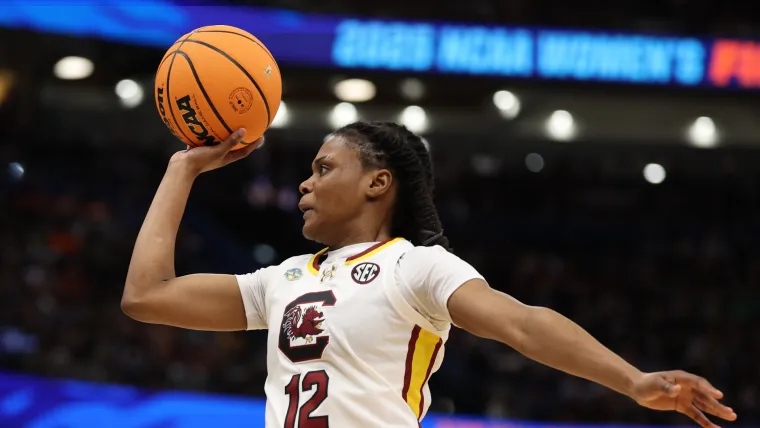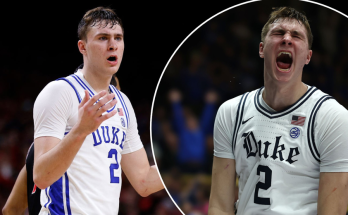South Carolina Gamecocks fans find themselves in a state of unease after an explosive accusation surfaced in the women’s college basketball world this week. At the center of the controversy is star freshman MiLaysia Fulwiley, a Columbia native and homegrown sensation who played an integral role in South Carolina’s undefeated national championship run under head coach Dawn Staley. Now, with the offseason in full swing and the transfer portal buzzing, reports have emerged that Ole Miss head coach Yolett McPhee-McCuin has been accused of tampering with Fulwiley—allegedly trying to lure her away from the program.
The notion that Fulwiley, one of the brightest young stars in women’s college basketball, could be persuaded to leave the program she grew up rooting for has sent shockwaves through the Gamecock fanbase. Even the mere suggestion of tampering involving her has been enough to ignite a firestorm across social media and sports talk circles, with fans, alumni, and national pundits weighing in on the gravity of the situation.
Fulwiley, who averaged 11.5 points, 3.5 assists, and 2.2 rebounds per game as a freshman, dazzled fans throughout the season with her fearless play, elite handles, and ability to shine in big moments. Her highlight-reel passes and step-back threes became a regular feature on ESPN and social media feeds. For South Carolina, she was more than just a freshman contributor—she was a symbol of the program’s future and a continuation of Dawn Staley’s South Carolina dynasty. A local product who stayed home to help build something historic.
But that sense of stability has been tested in recent days. According to multiple sources close to the situation, McPhee-McCuin—or members of her coaching circle—allegedly reached out to individuals in Fulwiley’s orbit in what is being described as an improper attempt to gauge her interest in transferring to Ole Miss. The specifics of the communication remain murky, but it’s enough that South Carolina supporters and internal figures have raised serious concerns behind the scenes.
Under NCAA rules, any direct or indirect communication from a coach to a player who is not in the transfer portal is considered tampering. The transfer portal is meant to be the gatekeeper that allows programs to reach out to student-athletes. Until a player enters, coaches are prohibited from initiating contact or encouraging a move. This has not stopped some programs from trying to quietly test the waters—especially when it comes to players of Fulwiley’s caliber.
South Carolina fans have long been wary of poachers circling their program. With name, image, and likeness (NIL) money becoming a growing influence in player decisions, the Gamecocks’ dominance on the court has made them a prime target. But this latest allegation involving a fellow SEC school—one that South Carolina faces regularly and has built a bit of a rivalry with—cuts deeper. It has brought forth concerns not just about losing a star player, but about a breach of trust within the league.
The Gamecock community has responded with fierce loyalty. Fans have flooded social media with posts showing their support for Fulwiley and disgust at the idea that another SEC program would try to meddle with her future. “Stay home, MiLaysia” has become a rallying cry across X (formerly Twitter) and Instagram. Others have called on the SEC and the NCAA to investigate the alleged tampering and to hold programs accountable if rules were broken.
Head coach Dawn Staley has not publicly commented on the situation, but her silence is likely strategic. Staley is known for her calculated leadership and her fierce protection of her players. It’s expected that she and the South Carolina athletic department are handling matters privately through the proper channels. Still, for many fans, the silence is deafening, and the tension is mounting.
Ole Miss has not issued a formal statement either, though insiders suggest the program is pushing back against the accusations and may argue that the allegations are based on misinterpretations or third-party interactions not tied directly to the coaching staff. In the world of recruiting, where agents, family members, and NIL representatives often blur the lines of contact, proving tampering can be complicated. But perception matters—and the perception right now is that Ole Miss may have stepped over the line.
This isn’t the first time McPhee-McCuin has been in the spotlight. Known for her energetic style and recruiting prowess, she’s helped elevate Ole Miss into a consistent NCAA Tournament presence. But with that rise has come scrutiny, and this latest controversy is sure to increase it. If Fulwiley had expressed dissatisfaction or had shown signs of looking elsewhere, the situation might be more understandable. But there’s been no indication—publicly or privately—that she has any interest in leaving Columbia.
On the contrary, Fulwiley has repeatedly spoken about how much it means to play for her hometown school. After winning the national championship, she told reporters that suiting up for the Gamecocks was a dream come true and that she wanted to be part of a legacy. Her bond with Staley, her teammates, and the community appears genuine and deep-rooted. That’s part of why this situation feels so personal to fans.
Tampering is becoming an increasingly common concern in the college athletics world, especially with the transfer portal offering immediate eligibility. In theory, the portal is supposed to give players freedom and flexibility. But in practice, it has created a chaotic ecosystem where backchannel communications and behind-the-scenes deals are becoming the norm. NIL has only intensified the stakes. Programs with deep pockets or aggressive third-party boosters now have the means to entice players to consider a move—even if it means violating the rules.
For South Carolina, the situation is a reminder that no program, no matter how successful or loyal its players appear, is immune from the pressures of modern college sports. Even a championship ring can’t prevent other schools from trying to break up a good thing. The idea that Fulwiley, a local star and fan favorite, could be at the center of such controversy is painful for many.
In the coming weeks, the NCAA may be called upon to investigate the matter. If enough evidence exists to suggest tampering occurred, sanctions could follow. But historically, enforcement has been uneven at best. That’s why so many fans are taking matters into their own hands—through vocal support, public pressure, and unrelenting loyalty to Fulwiley.
For now, Fulwiley remains a South Carolina Gamecock. There’s been no announcement, no portal entry, and no indication that she plans to go anywhere. But the damage of the accusation—if not to the team’s structure, then to the fanbase’s sense of security—has already been done.
It’s a new era in college sports, one where even an undefeated season and a hometown hero aren’t enough to guarantee peace. South Carolina fans are on alert, not because they doubt Fulwiley’s commitment, but because they know how quickly things can change in today’s landscape. And because they know other programs are watching, waiting, and possibly plotting.
In the meantime, the Gamecock community continues to close ranks around their star. They know what she means to the program, to the city of Columbia, and to the legacy of Dawn Staley’s South Carolina. MiLaysia Fulwiley represents not just talent, but pride. And no one—especially not a rival SEC school—will steal that without a fight.



